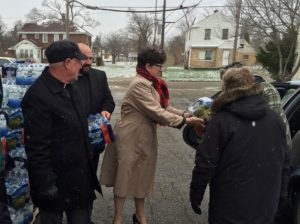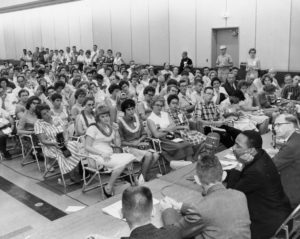Lutherans are taking action across the country! Below you will find our monthly State Advocacy Newsletter. Share with your friends!
____________________
ELCA Advocacy Office, Washington, D.C.
The Rev. Amy Reumann, director
GOD’S WORK. OUR HANDS. OUR VOICES: ELCA Advocacy sent out resources in early August, encouraging group discussions around civic participation, advocacy and ELCAvotes as additional congregational activities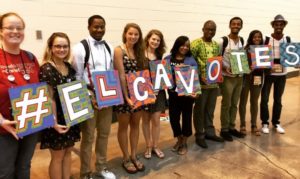 for “God’s work. Our hands.” Sunday, a day of service held on September 11th. In 2015, congregations engaged in “God’s work. Our hands.” Sunday sent hundreds of letters to their elected officials in support of U.S. child hunger programs and the Green Climate Fund. Congregations are encouraged to continue to take action on child nutrition, an ongoing federal issue, or engage in a letter writing campaign around an issue of concern this year. Among the advocacy resources, the message included #ELCAvotes materials for the election in November. Resources include congregation guides on civic participation, a Bible study, and a discussion guide on voting rights and racial justice.
for “God’s work. Our hands.” Sunday, a day of service held on September 11th. In 2015, congregations engaged in “God’s work. Our hands.” Sunday sent hundreds of letters to their elected officials in support of U.S. child hunger programs and the Green Climate Fund. Congregations are encouraged to continue to take action on child nutrition, an ongoing federal issue, or engage in a letter writing campaign around an issue of concern this year. Among the advocacy resources, the message included #ELCAvotes materials for the election in November. Resources include congregation guides on civic participation, a Bible study, and a discussion guide on voting rights and racial justice.
ACCOMPANYING MIGRANT MINORS WITH PROTECTION, ADVOCACY, REPRESENTATION AND OPPORTUNITIES (AMMPARO): The ELCA Churchwide Assembly passed the AMMPARO strategy Aug. 10, reinforcing ELCA Advocacy’s role in helping address the root causes of migration and protect children and families displaced from their communities in Central America. The afternoon it passed, ELCA Advocacy sent a message explaining the initiative, its passage and its context. There are currently two bills in Congress that address some of these conditions, the State and Foreign Operations appropriations bill and the Secure the Northern Triangle Act (S. 3106/H.R. 5850).
from their communities in Central America. The afternoon it passed, ELCA Advocacy sent a message explaining the initiative, its passage and its context. There are currently two bills in Congress that address some of these conditions, the State and Foreign Operations appropriations bill and the Secure the Northern Triangle Act (S. 3106/H.R. 5850).
ELCA Advocacy will continue to advocate for strong human rights conditions in any funding toward Central America, including conditioning aid on protecting the right to seek asylum.
NATIONAL PARKS TURN 100 YEARS OLD: The National Park Service celebrated its centennial Aug. 25. President Barack Obama took the opportunity during this anniversary month to protect more than 87,500 acres of forests and streams in central Maine as the Katahdin Woods and Waters National Monument and to create the world’s largest marine protected area, the Papahanaumokuakea Marine National Monument off the coast of Hawaii. The president visited the Hawaiian monument on Sept. 1. Earlier in August, ELCA Advocacy joined an interfaith letter praising the national parks and initiatives to conserve God’s creation.
EDUCATION: The ELCA’s social statement “Our Calling in Education” states that we minister in two ways: to educate people in the Christian faith for their vocation, and to strive with others to ensure that all have access to high-quality education that develops personal gifts and abilities and serves the common good. Education issues are also critical this November; early childhood to higher education issues are making headlines in campaigns. Read more on the ELCA Advocacy blog!
____________________
Lutheran Office for World Community, United Nations, New York, N.Y.
Dennis Frado, director
U.N. SUMMIT ON ADDRESSING LARGE MOVEMENTS OF REFUGEES AND MIGRANTS: In early August, U.N. member states reached agreement on three texts related to the Sept. 19 summit on addressing large movements of refugees and migrants. The primary aim of the summit is to find a path toward a better international response to the situations of both groups. If the outcome document is formally adopted, two multiyear processes will commence to prepare a global compact for refugees and a global compact on migration. The one on refugees will build on the Refugee Convention of 1951 as amended and will be developed with the help of the U.N. High Commissioner for Refugees in 2018. Because there is no comparable treaty concerning migrants, an intergovernmental negotiation process will commence next year with the aim of having a proposal for adoption at an intergovernmental conference on international migration in 2018. LOWC is collaborating closely with The Lutheran World Federation (LWF) in advance of the summit as part of a civil society action committee. LWF endorsed the committee’s call for “A New Deal for refugees, migrants and societies.”
LOWC staff will attend the summit and is planning to be engaged with the LWF in post-summit follow-up activities in New York and Geneva. LOWC is also coordinating closely with the assistant director for migration policy and advocacy in the ELCA Advocacy office in Washington, D.C.
BUILDING A JUST AND SUSTAINALBE PEACE PROCESS IN COLOMBIA: On Aug. 18, program associate Charlotte Mildenberger attended the meeting “Building a Just and Sustainable Peace Process in Colombia” at the Church Center for the United Nations. It was co-organized by the World Council of Churches and Caritas Internationalis and co-sponsored by The Lutheran World Federation.
U.N. delegates, representatives from the Mission of Colombia and representatives from other nongovernmental organizations attended this meeting. Danilo Rueda, director of the Inter-Ecclesial Commission for Justice and Peace, gave an overview about the current situation in Colombia and said the forthcoming agreements would be a foundation for peace. There are 6 million displaced people in Colombia. Many others have disappeared and suffered torture, especially those who are politically active, but they aren’t counted in official statistics. The commission defends the rights of the victims and their families, including the rights of children. It also fights impunity.
Drug-related crime with paramilitary group involvement is a major continuing concern, along with the fear of its expansion. As parts of the Colombian military are attacking peacebuilders, an important question is how to include the police and the military within the peace process.
California
Mark Carlson, Lutheran Office of Public Policy
CALIFORNIA LEGISLATURE: The California Legislature returned from a month-long recess Aug. 1. As this was written it was nearing the Aug. 31 end of its two-year session, when the focus of LOPP-CA turns to bills on 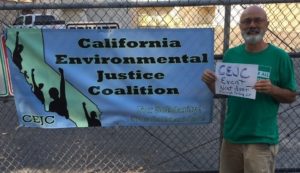 Gov. Jerry Brown’s desk, and November ballot measures.
Gov. Jerry Brown’s desk, and November ballot measures.
CARE FOR CREATION: LOPP-CA was site host for the California Environmental Justice Coalition conference and lobby day opening dinner, which brought grassroots activists to the Capitol from some of the harder places in the state: Kettleman City, West Oakland, North Richmond, Bayview-Hunters Point, East Los Angeles, and Harbor Gateway. LOPP-CA will be site host for a dinner sponsored by the Pesticide Action Network for participants of a five-day Society of Environmental Journalists national conference.
CRIMINAL JUSTICE REFORM: LOPP-CA was asked to accompany an advocacy team of the Boys and Men of Color Network, which brought hundreds to the Capitol to support bills addressing gang registries, privatized incarceration and law enforcement policies affecting immigrants, among other challenges. AB 2590, placing some restorative justice language in the penal code, is headed to Brown’s desk. We are recruiting Lutherans to participate in a Sept. 12 briefing with Brown on his Prop. 57 sentencing reform.
ECONOMIC JUSTICE/HUMAN DIGNITY: LOPP-CA provided grassroots and direct advocacy in support of a bill providing overtime pay after eight hours in a day and 50 in a week for farmworkers. The previous requirement had been 10 hours/day, 60/week. Besides the economic benefits, AB1066 carries great symbolic meaning about human dignity and a lower tier of workers.
Colorado
Peter Severson, Lutheran Advocacy Ministry – Colorado
ELCA CHURCHWIDE ASSEMBLY: LAM-CO Director Peter Severson was present with Rocky Mountain 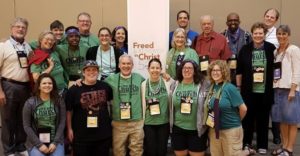 Synod voting members at the 2016 ELCA Churchwide Assembly in New Orleans. Nearly 1,000 voting members from across the church took action on matters related to Lutheran-Catholic dialogue, the new “Word and Service” roster, the AMMPARO strategy (accompanying migrant minors), fossil fuels, Israel-Palestine and a number of other important issues in the life of the church. Advocates will have a lot to work with as a result of the assembly’s actions.
Synod voting members at the 2016 ELCA Churchwide Assembly in New Orleans. Nearly 1,000 voting members from across the church took action on matters related to Lutheran-Catholic dialogue, the new “Word and Service” roster, the AMMPARO strategy (accompanying migrant minors), fossil fuels, Israel-Palestine and a number of other important issues in the life of the church. Advocates will have a lot to work with as a result of the assembly’s actions.
FALL BALLOT ADVOCACY: Seven measures and two constitutional amendments will appear on the ballot for Colorado voters this November. LAM-CO is a supporter of Amendment T, known informally as “No Slavery, No Exceptions.” Amendment T supporters held a press conference Aug. 23 on the steps of the state Capitol to voice the importance of the measure. LAM-CO also supports Amendment 70, a measure to increase the state’s minimum wage to $12/hour by 2020. People of faith will be invited to join events in September and October to learn more about these ballot issues. Follow LAM-CO on social media or join our email list to get the latest information.
CONGREGATIONAL VISITS: Thanks to members of the Aurora Area Ministry Strategy and Lord of the Mountains Lutheran Church, Dillon, Colo., for inviting LAM-CO to join you this month! Our advocacy is strengthened when everyone raises their voice together.
(Photo caption: Rocky Mountain Synod voting members, volunteers and guests at the 2016 Churchwide Assembly, New Orleans. Photo credit: RMS Facebook page.)
____________________
Minnesota
Tammy Walhof, Lutheran Advocacy – Minnesota
SPECIAL SESSION NOT HAPPENING: Despite reports in late July of an August special session, negotiations broke down primarily over light-rail issues (state funding share vs. permission for increased Hennepin County share vs. no Southwest Metro Line regardless of funding mechanisms).
SIGNIFICANT LOSSES: Sadly, without a special session, Affordable Housing Bonds of $45 million were lost. While much less than needed and only about a third of what Lutheran Advocacy and the Homes for All Coalition were working to get this session, it would have been decidedly better than nothing. Also lost were bonding funds for clean-water infrastructure and statewide transportation infrastructure, in addition to a “tax relief” bill that included tax credits for low-income working families.
FALL ELECTIONS: All state legislators (House and Senate) are up for election this year. This makes it an effective time to contact candidates about Lutheran Advocacy’s key issues. Candidates from all parties, especially those who have had major party standing in Minnesota (MN Republican Party, MN Democratic-Farmer-Labor Party, Independence Party and Green Party) should hear about these priorities at candidate forums, meet-and-greet events, parades, debates, etc. It’s also good timing to send notes to candidates about these issues. Lutheran Advocacy-MN is in the process of creating an election guide with questions and messaging to share with candidates. It should be ready in a couple weeks.
LUTHERAN ADVOCACY-MN POSITIONS AVAILABLE:
- Part-time office/communications assistant
- Paid internship (housing/hunger focus)
- Unpaid internship (clean energy focus)
Send cover questions, letters and resumes to tammy@lcppm.org.
____________________
New Mexico
Ruth Hoffman, Lutheran Advocacy Ministry – New Mexico
lutheranadvocacynm.org
The interim Legislative Health and Human Services Committee met in August at the University of New Mexico. LAM-NM Director Rut h Hoffman testified before the committee and urged the members to push for more oversight of the administration of the SNAP and Medicaid programs by the state Human Services Department. The department has been found to be violating a federal court order to comply with federal rules about how enrollment in federal benefit programs is carried out. LAM-NM, working with other advocacy groups, is advo
h Hoffman testified before the committee and urged the members to push for more oversight of the administration of the SNAP and Medicaid programs by the state Human Services Department. The department has been found to be violating a federal court order to comply with federal rules about how enrollment in federal benefit programs is carried out. LAM-NM, working with other advocacy groups, is advo cating that the department improve their IT systems; make client notices accurate and understandable; create a comprehensive, accurate online worker manual; and collect and share data on enrollment and processing. The U.S. Department of Agriculture has also found the state Human Services Department to be in violation of federal regulations in its administration of the SNAP program. These ongoing violations are harming low-income families across the state by denying them the help they need. New Mexico has among the highest rates of poverty and hunger in the country.
cating that the department improve their IT systems; make client notices accurate and understandable; create a comprehensive, accurate online worker manual; and collect and share data on enrollment and processing. The U.S. Department of Agriculture has also found the state Human Services Department to be in violation of federal regulations in its administration of the SNAP program. These ongoing violations are harming low-income families across the state by denying them the help they need. New Mexico has among the highest rates of poverty and hunger in the country.
____________________
Ohio
Nick Bates, The Faith Coalition for the Common Good
Three congregations within less than three miles of each other worked together to raise awareness and resources to help those who are hungry in Columbus, Ohio. Clinton Heights and North Community  Lutheran churches held their second-annual hunger march down High Street, through the Clintonville neighborhood, collecting more than 90 bags of food, breaking stereotypes and raising awareness about the realities of hunger in Ohio and Columbus. The following day, Maple Grove United Methodist Church sponsored a “Feed the World Sunday” where they used their worship time to engage in service projects and letter writing. Congregation members wrote letters to Sens. Rob Portman and Sherrod Brown about the importance of childhood nutrition programs in our community. Many letter writers were actually young people in the congregation who want to see policy changes to better serve the community.
Lutheran churches held their second-annual hunger march down High Street, through the Clintonville neighborhood, collecting more than 90 bags of food, breaking stereotypes and raising awareness about the realities of hunger in Ohio and Columbus. The following day, Maple Grove United Methodist Church sponsored a “Feed the World Sunday” where they used their worship time to engage in service projects and letter writing. Congregation members wrote letters to Sens. Rob Portman and Sherrod Brown about the importance of childhood nutrition programs in our community. Many letter writers were actually young people in the congregation who want to see policy changes to better serve the community.
We would also like to thank John Johnson, domestic policy director for the ELCA, for visiting us in Ohio to discuss how we can effectively grow our advocacy ministries. It is a strong reminder that we are in ministry together and are stronger together. Visit HungerNetOhio.org for more information about advocacy ministries in Ohio.
____________________
Pennsylvania
Tracey DePasquale, Lutheran Advocacy – Pennsylvania
With the General Assembly in recess until September, August provided time for assessing and strengthening partnerships within the church, including relationships with Lutheran camps and seminaries. Meetings are exploring ways to lift up stories from our ministries and create a program that would include advocacy as an element of faith formation. LAMPa’s policy council will engage these topics and more as we restructure for mission at our annual retreat in September.
LAMPa is also equipping synodical women’s organizations to support Safe Harbor legislation as part of the churchwide dedicated day of service on Sept. 11. Congregations may label bars of soap with the human trafficking hotline information for distribution at hotels as a service project. Lower Susquehanna’s organization adopted a resolution in support of SB851 and is sending a letter to the chair of the Senate Judiciary Committee. The resolution also calls on members to write their individual lawmakers in support of the bill that would divert trafficked children from the criminal justice system into appropriate services.
Very little is expected to be addressed in the few remaining weeks of the legislative session beyond finishing details connected to the budget. We remain alert for any movement on a memo circulated early in the session on possible payday lending legislation.
Texas
Samuel D. Brannon, Texas Impact
On Aug. 22, Dr. John Hellerstedt, commissioner of the Texas Department of State Health Services (DSHS), met in Austin with Lutheran and other faith leaders to discuss Texas’ Zika plan.
“All of us play a role in limiting the potential that it gets here to Texas and the potential for it to spread,” said Hellerstedt. He explained that practices like using mosquito repellent, putting screens in open windows and wearing long-sleeve clothing will go a long way in preventing contact with an infected mosquito. He added that personal prevention measures can be almost 100 percent effective. “We don´t have to be perfect at this, but we do need to be as consistent as possible in these practices,” said Hellerstedt.
He said the White House and the Centers for Disease Control and Prevention have been working closely with the state on Texas’ strategy. So far, all cases reported in Texas are the result of mosquito bites received during foreign travel or were passed by sexual transmission. DSHS asked faith organizations to engage their communities because, although behavioral change is difficult, the public needs to start taking real preventive measures. Congregations can help by:
- Meeting with local officials to be communication partners.
- Informing their communities. Resources available here: org.
- Going door-to-door with preventive information in high-risk neighborhoods.
Preparation, education and rapid response – coordinated at the state and local level, and with partnerships between state agencies and community organizations like congregations – is the best way to protect our communities from the spread of Zika.
____________________
Washington
Paul Benz, Faith Action Network
ELECTED OFFICIAL MEETINGS: Faith Action Network (FAN) is busy meeting with elected officials and the faith advocates in their districts. We’re primarily focusing on state legislators but also meeting with county council members and members of Congress. Our main state issues are: revenue solutions to fund K-12 education and our broken mental health systems, repealing our state’s death penalty statute and reforming our use of deadly force statute. Our two primary congressional issues are child nutrition and passing sensible sentencing reform. At all these meetings, we are sharing a statement: Interfaith Leaders Call for a Responsible & Respectful 2016 Electoral Process.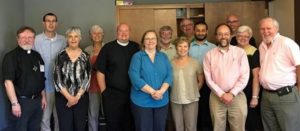
CANDIDATE/INITIATIVE FORUMS: FAN is currently planning candidate forums in districts with competitive state Senate races, each hosted by congregations and moderated by faith leaders. We are also doing a forum on two key ballot initiatives: increasing the minimum wage while establishing paid sick and safe leave, and reducing gun violence using “Extreme Risk Protection Orders.”
NEW ORGANIZING INTERNS: FAN will soon have its three new organizing interns in place: Chasity Jones from Louisiana with the United Methodist Global Missions program, Joshua Sullivan from the Lutheran Theological Seminary at Philadelphia, and David Choi from Virginia with the United Church of Christ’s Justice Leadership Program.doing a forum on two key ballot initiatives: increasing the minimum wage while establishing paid sick and safe leave, and reducing gun violence using “Extreme Risk Protection Orders.”
ANNUAL CLUSTER GATHERINGS: Every fall, FAN gathers our advocates and friends together in 17 geographic clusters all around our state. We do this to hear what FAN is doing and to hear what advocacy-related projects our various faith communities are doing. The overarching goal is to bring people of different faith traditions together to see how we can be more effective in our common work of advocating for justice.
(Photo caption: Our Interfaith Leaders Council gathered this month to call for a responsible, honest, and respectful election season this year.)
____________________
Wisconsin
Cindy Crane, Lutheran Office for Public Policy in Wisconsin
POVERTY AND HUNGER: The hunger team in La Crosse is talking about supporting the efforts of ELCA World Hunger and, with LOPPW, advocating for a just bill for the Child Nutrition Reauthorization.
ELCAVOTES: LOPPW is working with the League of Women Voters to plan a candidate forum in the E ast-Central Synod of Wisconsin and is working with a council member to organize an additional forum.
ast-Central Synod of Wisconsin and is working with a council member to organize an additional forum.
UPCOMING CONFERENCE: The anti-trafficking conference LOPPW is organizing with Cherish All Children will include legislators, an outreach worker to homeless youth, and at least one individual who was trafficked as a youth and now works to stop sex trafficking. More information at loppw.org/events/.
DAYS AFTER MILWAUKEE WAS HIT BY VIOLENCE: “One good thing that might come out of what happened in Milwaukee is that it will bring national attention to Milwaukee’s race problems. … We need to have dialogue, but sometimes things erupt. … Not everyone is racist . … We can’t just separate into sides all the time; that won’t work in the long run.” Spoken by a high school student unearthing soil at Alice’s Garden (director/minister Venice Williams is an LOPPW Advisory Council member).
____________________
What advocacy efforts are going on in your synod or state? We want to hear about it!
